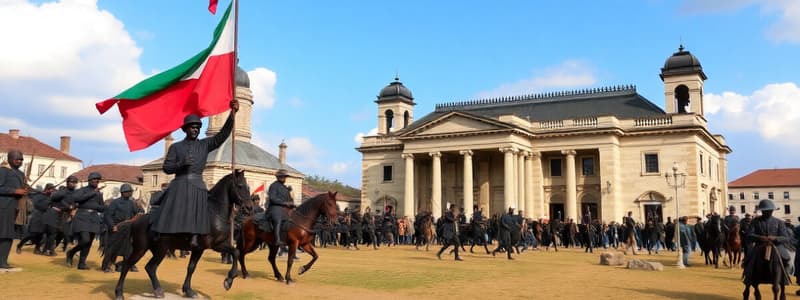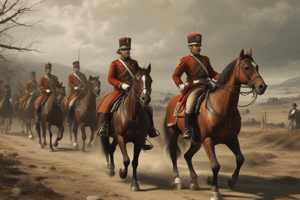Podcast
Questions and Answers
The Crimean War began as a result of:
The Crimean War began as a result of:
- British concerns over Russian expansionism. (correct)
- Russia's desire to prepare for the “inevitable" collapse of the Ottoman Empire. (correct)
- Conflict between Orthodox Christians and Roman Catholics under Muslim rule. (correct)
- All of the above. (correct)
In addition to claiming some Austrian territory, the unifications of Italy and Germany in the 19th century weakened the Austrian Empire through:
In addition to claiming some Austrian territory, the unifications of Italy and Germany in the 19th century weakened the Austrian Empire through:
- Blockading Austrian continental trade routes to western Europe.
- Sending a message to non-Germans within the Empire to push for their national sovereignty. (correct)
- Souring the historic alliance between Austria and Russia during the Crimean War. (correct)
- Making the Austrians nervous about engaging in another war against Prussia.
Prime Minister Count Camillo di Cavour brought Piedmont into the Crimean War in order to:
Prime Minister Count Camillo di Cavour brought Piedmont into the Crimean War in order to:
- Establish King Victor Emmanuel III's legitimate claim to the Piedmont throne.
- Lay claim to territories within the Russian Empire.
- Establish Piedmont's right to intervene on behalf of Lombardy and Venetia. (correct)
- Convince Napoleon III that Austrian power of Northern Italy violated some basic principles of the French Revolution (1789).
Following the revolutions of 1848 and the reconstitution of the German Confederation in 1851, most German states wielded both the “carrot” and “stick” over their subjects by:
Following the revolutions of 1848 and the reconstitution of the German Confederation in 1851, most German states wielded both the “carrot” and “stick” over their subjects by:
The Peace of Prague in 1866 secured:
The Peace of Prague in 1866 secured:
Rewriting the Ems Dispatch of 1870, Bismarck goaded Napoleon III into war against Prussia through:
Rewriting the Ems Dispatch of 1870, Bismarck goaded Napoleon III into war against Prussia through:
Unlike fascism, liberalism, or communism, nationalism isn't an ideology, but more along the lines of a religion in that it has the ability to represent the nation:
Unlike fascism, liberalism, or communism, nationalism isn't an ideology, but more along the lines of a religion in that it has the ability to represent the nation:
The Sonderweg thesis suggested that aberrant German nationhood created discrepancies between modern economic development and the persistence of traditional and antidemocratic structures in order to explain:
The Sonderweg thesis suggested that aberrant German nationhood created discrepancies between modern economic development and the persistence of traditional and antidemocratic structures in order to explain:
The Bismarckian nation-state demanded a monopoly of national loyalty, without:
The Bismarckian nation-state demanded a monopoly of national loyalty, without:
Like the history of modern Europe, the history of Württemberg begins with the French Revolution (1789) as Württemberg joined Napoleon against Russia and Austria, and was rewarded with territory, particularly from Austria, and:
Like the history of modern Europe, the history of Württemberg begins with the French Revolution (1789) as Württemberg joined Napoleon against Russia and Austria, and was rewarded with territory, particularly from Austria, and:
Following the revolutions of 1848 and the reconstitution of the German Confederation in 1851, most German states wielded both the "carrot" and "stick" over their subjects by:
Following the revolutions of 1848 and the reconstitution of the German Confederation in 1851, most German states wielded both the "carrot" and "stick" over their subjects by:
Flashcards
Crimean War cause
Crimean War cause
The Crimean War started due to a combination of factors, including British concern over Russian expansionism, Russia's ambition to exploit the Ottoman Empire's decline, and the religious conflict between Orthodox and Catholic Christians in the region.
Italian/German Unification impact on Austria
Italian/German Unification impact on Austria
The unification of Italy and Germany weakened the Austrian Empire by stirring up nationalistic aspirations among non-German populations within the empire, pushing them to seek independence.
Piedmont's Crimean War motive
Piedmont's Crimean War motive
Piedmont joined the Crimean War to bolster its claim to intervene on behalf of Lombardy and Venetia, increasing its influence over Italian territories.
German states' rule after 1848 and 1851
German states' rule after 1848 and 1851
Signup and view all the flashcards
Peace of Prague (1866) outcome
Peace of Prague (1866) outcome
Signup and view all the flashcards
Bismarck's use of Ems Dispatch
Bismarck's use of Ems Dispatch
Signup and view all the flashcards
Nationalism as an ideology
Nationalism as an ideology
Signup and view all the flashcards
Sonderweg thesis explanation
Sonderweg thesis explanation
Signup and view all the flashcards
Bismarck's nation-state demand
Bismarck's nation-state demand
Signup and view all the flashcards
Württemberg's history origin
Württemberg's history origin
Signup and view all the flashcards
Nationalism
Nationalism
Signup and view all the flashcards
German Confederation
German Confederation
Signup and view all the flashcards
Otto Von Bismarck
Otto Von Bismarck
Signup and view all the flashcards
German Unification
German Unification
Signup and view all the flashcards
Franco-Prussian War
Franco-Prussian War
Signup and view all the flashcards
Napoleon III
Napoleon III
Signup and view all the flashcards
European Control of Africa
European Control of Africa
Signup and view all the flashcards
White Man's Burden
White Man's Burden
Signup and view all the flashcards
Imperialism's impact on the Balance of Power
Imperialism's impact on the Balance of Power
Signup and view all the flashcards
Berlin Conference 1885
Berlin Conference 1885
Signup and view all the flashcards
Congo Free State & Leopold II
Congo Free State & Leopold II
Signup and view all the flashcards
Joseph Conrad's 'Heart of Darkness'
Joseph Conrad's 'Heart of Darkness'
Signup and view all the flashcards
Cecil Rhodes & British Protectorates
Cecil Rhodes & British Protectorates
Signup and view all the flashcards
Lothar von Trotha & the Herero War
Lothar von Trotha & the Herero War
Signup and view all the flashcards
Trotha's 'Racial Struggle'
Trotha's 'Racial Struggle'
Signup and view all the flashcards
Imperial propaganda & Pears Soap
Imperial propaganda & Pears Soap
Signup and view all the flashcards
Kaiser Wilhelm II & Naval Power
Kaiser Wilhelm II & Naval Power
Signup and view all the flashcards
German Naval Arms Race
German Naval Arms Race
Signup and view all the flashcards
German 'Place in the Sun'
German 'Place in the Sun'
Signup and view all the flashcards
Impact of Imperialism on African Societies
Impact of Imperialism on African Societies
Signup and view all the flashcards
The Scramble for Africa
The Scramble for Africa
Signup and view all the flashcards
Social Darwinism and Imperialism
Social Darwinism and Imperialism
Signup and view all the flashcards
The Suez Canal and Imperialism
The Suez Canal and Imperialism
Signup and view all the flashcards
Resistance to Imperialism in Africa
Resistance to Imperialism in Africa
Signup and view all the flashcards
The Legacy of Imperialism
The Legacy of Imperialism
Signup and view all the flashcards
The Role of Technology in Imperialism
The Role of Technology in Imperialism
Signup and view all the flashcards
The Role of Nationalism in Imperialism
The Role of Nationalism in Imperialism
Signup and view all the flashcards
The Impact of Imperialism on European Society
The Impact of Imperialism on European Society
Signup and view all the flashcards
The Congo Free State's Atrocities
The Congo Free State's Atrocities
Signup and view all the flashcards
The Impact of Imperialism on the Middle East
The Impact of Imperialism on the Middle East
Signup and view all the flashcards
The Role of Diplomacy in Imperialism
The Role of Diplomacy in Imperialism
Signup and view all the flashcards
The Role of Economics in Imperialism
The Role of Economics in Imperialism
Signup and view all the flashcards
The Rise of Anti-Imperialist Movements
The Rise of Anti-Imperialist Movements
Signup and view all the flashcards
The Impact of Imperialism on Indigenous Cultures
The Impact of Imperialism on Indigenous Cultures
Signup and view all the flashcards
The Role of Race in Imperialism
The Role of Race in Imperialism
Signup and view all the flashcards
The Role of Religion in Imperialism
The Role of Religion in Imperialism
Signup and view all the flashcards
Study Notes
Quiz 1: Empire, War, and Revolution in Europe, 1850-1939
-
Question 1: The Crimean War began due to British concerns over Russian expansionism, Russia's desire for the Ottoman Empire's collapse, and conflicts between Orthodox and Roman Catholics under Muslim rule.
-
Question 2: The 19th-century Italian and German unifications weakened the Austrian Empire by damaging its historic alliance with Russia during the Crimean War. It also sent a message to non-German populations within Austria to demand national sovereignty, created anxieties about engaging in wars again Prussia, and disrupted Austrian trade routes westward.
-
Question 3: Piedmont's Prime Minister, Count Camillo di Cavour, brought Piedmont into the Crimean War to establish intervention rights for Lombardy and Venetia.
-
Question 4: Following the 1848 revolutions and the 1851 German Confederation, German states used both advantageous and coercive methods to control their people. These included expanding police forces, creating public services and infrastructure, utilizing economic development to control their population, and withdrawing/limiting voting and parliamentary rights.
-
Question 5: The 1866 Peace of Prague resulted in Prussian dominance in Germany, and the allocation of Schleswig-Holstein to the German Confederation.
-
Question 6: Through manipulating the Ems Dispatch of 1870, Bismarck incited Napoleon III to declare war on Prussia, by highlighting the candidacy of a Prussian prince to the Spanish throne.
-
Question 7: Nationalism isn't an ideology but rather akin to a religion, capable of representing the nation.
-
Question 8: The "Sonderweg" thesis, explains the divergent path of German nationhood contrasting modern economic development with traditional anti-democratic structures.
-
Question 9: The Bismarckian nation-state required absolute national allegiance, without compromising regional identities, underselling the Prussian victory's significance in the German civil war, and acknowledging numerous regional historical accounts within a single national history. They also did not maintain pre-unification regional institutions.
-
Question 10: Württemberg's history aligns with broader European developments, notably involving the French Revolution of 1789, and its involvement in Napoleonic conflicts, and the receipt of land from Austria in the process, including the ability to suppress the region's Catholic minority.
Studying That Suits You
Use AI to generate personalized quizzes and flashcards to suit your learning preferences.




